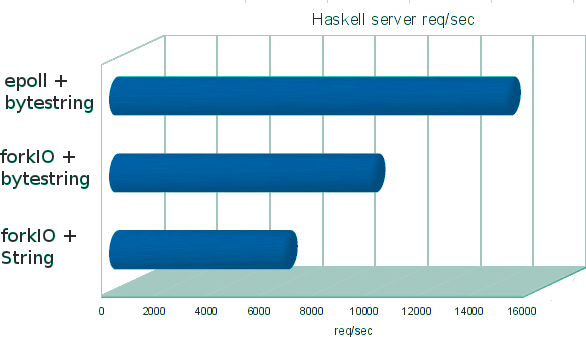Simple Servers
Some example of simple web server designs using increasingly more sophisticated approaches. Requirements:
- Recent GHC
- Libraries: network, network-bytestring, event
Some more context on the background to this problem is available.
Benchmarks with httperf,
$ httperf --server=localhost --port=5002 --uri=/ --num-conns=10000
Author: dons
Results
Basic concurrent server
Concurrent, with String IO. Here on each accept from the main thread, we create a new Handle, and forkIO a lightweight Haskell thread to write a string back to the client. Relies on the runtime scheduler to wake up the main thread in a timely fashion (i.e. via the current 'select' mechanism).
import Network
import Control.Concurrent
import System.IO
main = withSocketsDo $ do
sock <- listenOn $ PortNumber 5002
loop sock
loop sock = do
(h,_,_) <- accept sock
forkIO $ body h
loop sock
where
body h = do
hPutStr h msg
hFlush h
hClose h
msg = "HTTP/1.0 200 OK\r\nContent-Length: 5\r\n\r\nPong!\r\n"
Measurements:
$ ghc -O2 --make A.hs- Request rate: 6569.1 req/s (0.2 ms/req)
Concurrent, with network-bytestring
Now, using bytestring IO (via the network-bytestring package) (but still using the rts' select-based preemptive threads). Just means we allocate nothing in the body, and avoid a couple of copies to do the IO.
{-# LANGUAGE OverloadedStrings #-}
import Data.ByteString.Char8
import Network hiding (accept)
import Network.Socket
import Network.Socket.ByteString (sendAll)
import Control.Concurrent
main = withSocketsDo $ do
sock <- listenOn $ PortNumber 5002
loop sock
loop sock = do
(conn, _) <- accept sock
forkIO $ body conn
loop sock
where
body c = do sendAll c msg
sClose c
msg = "HTTP/1.0 200 OK\r\nContent-Length: 5\r\n\r\nPong!\r\n"
Measurements:
$ ghc -O2 --make H.hs- Request rate: 9901.7 req/s (0.1 ms/req)
Epoll-based event callbacks
Now, instead of using the RTS' select mechanism to wake up threads, we use a custom epoll handler. Using epoll-based event handling, and bytestring IO. The epoll approach will be replace GHC's select model soon (design here showing how the concurrent Haskell primitives may be implemented in terms of epoll).
{-# LANGUAGE OverloadedStrings #-}
-- A simple example of an epoll based http server in Haskell.
--
-- Uses two libraries:
-- * network-bytestring, bytestring-based socket IO.
-- - cabal install network-bytestring:
--
-- * haskell-event, epoll-based scalable IO events
-- - git clone git://github.com/tibbe/event.git
-- - autoreconf ; then cabal install
import Network hiding (accept)
import Network.Socket (fdSocket, accept)
import Network.Socket.ByteString
import Data.ByteString.Char8
import System.Event
import System.Posix
import System.Posix.IO
main = withSocketsDo $ do
sock <- listenOn $ PortNumber 5002
let fd = fromIntegral (fdSocket sock)
mgr <- new
registerFd mgr (client sock) fd evtRead
loop mgr
client sock _ _ = do
(c,_) <- accept sock
sendAll c msg
sClose c
msg = "HTTP/1.0 200 OK\r\nContent-Length: 5\r\n\r\nPong!\r\n"
Measurements:
ghc -O2 --make Epoll.hs- Request rate: 15042.6 req/s (0.1 ms/req)
So significantly better.
